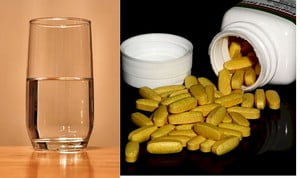Vitamin K is produced by our digestive systems’ friendly bacteria, but we still need to eat foods with vitamin K in order to stay healthy. The three types of vitamin K (K1, K2 and K3) can even be stored in fat to draw upon in times when fresh foods rich in vitamin K aren’t available. But, like everything else in health and medicine, more does not necessarily mean better. Too little and your skin, nose and inner organs can suddenly start bleeding. But too much is not good for you, either.
The Dangers of Mega-Doses
You really have to work at getting a vitamin K overdose. When the body is relatively healthy, it will either store excess vitamin K or excrete it in urine. But in recent years, people have been taking mega-doses of vitamins, including vitamin K. This is because vitamin K helps to keep bones healthy, along with calcium.
One of the reasons people may take mega-doses is to try and prevent osteoporosis or osteopena. The mega-doses of vitamin K are often combined with mega-doses of calcium, so some of the nasty side effects may be the fault of the calcium and not vitamin K.
Overdose Symptoms
Overdosing on any vitamin or nutritional supplement is not recommended. Please see your doctor before taking any large doses of any vitamin, even if it claims to be “natural”. There are three types of Vitamin K and Vitamin K3 seems to be the one that can get you very sick of taken in large doses. Here are the common symptoms:
Skin rash
Diarrhea
Nausea
Vomiting
Anem ia
But over time, these symptoms progress into liver damage and, if an infant is getting large doses, that infant is at risk of getting brain damage.
Getting Enough Vitamin K
Most people can find that their diet alone can give them all the vitamin K they need. The best sources are leafy green vegetables like spinach, kale and cabbage. Other green vegetables like peas and broccoli also contain vitamin K at slightly lower levels. Cow’s milk also contains vitamin K and needed calcium. Soybeans and eggs also contain vitamin K as well as vitamin fortified breakfast cereals. Green tea and members of the onion family have trace amounts.
You only need a little bit to get through the day. Men need about 80 milligrams while women need only 65mg. Children need less, starting at a mere 5 milligrams per day for a baby.
If You Are On Blood Thinners
Not only are the three vitamin Ks good for bone health, they also help the blood to clot. However, Vitamin K does not play well with blood-thinning medications like Wayfarin. If you are on blood thinning medication or if you have a history of blood clotting, be aware of vitamin K foods and cut down on them. You don’t have to cut them out of your diet entirely, but you will need to cut down.
Additional References:
eMedicine. “Toxicity, Vitamin.” http://emedicine.medscape.com/article/819426-overview
Merck Manuals Online Medical Library. “Vitamin K.” http://www.merck.com/mmpe/sec01/ch004/ch004m.html
Life Clinic. “Vitamin K.” http://www.lifeclinic.com/focus/nutrition/vitamin-k.asp
